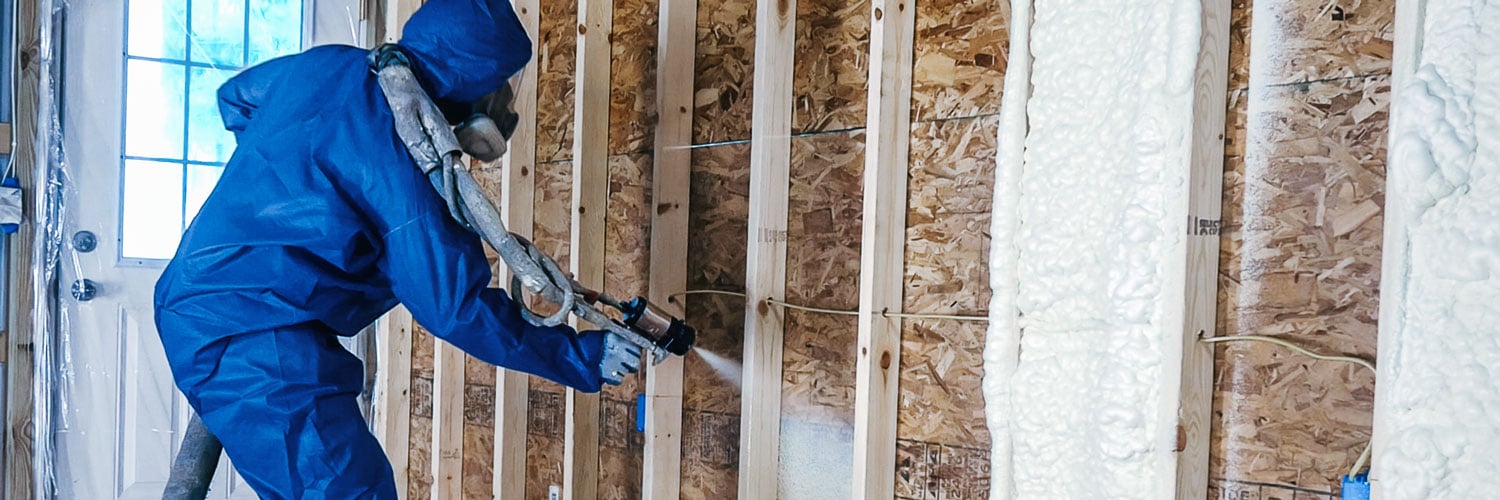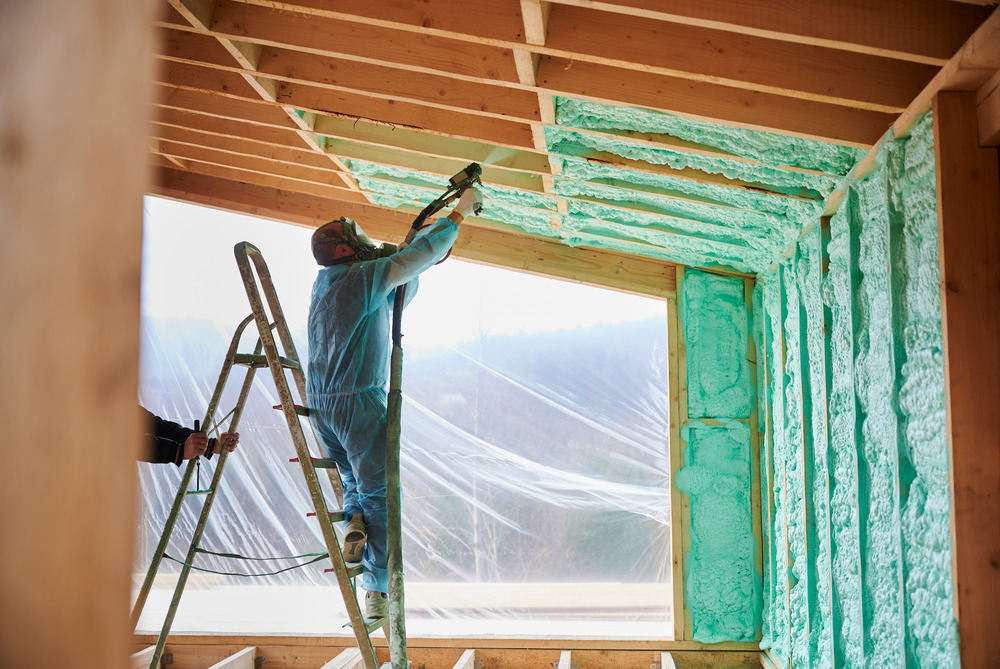Frequently Asked Questions Concerning Spray Foam Installation and Use
Frequently Asked Questions Concerning Spray Foam Installation and Use
Blog Article
Spray Foam: The Ultimate Option for Air Sealing and Insulation
Spray foam insulation has arised as a leading option for reliable air sealing and thermal insulation, using a distinct combination of residential or commercial properties that establish it aside from typical techniques. Its capability to increase and load gaps makes it particularly reliable in avoiding air leak, which can considerably impact energy effectiveness. Nevertheless, comprehending the complete scope of its benefits, installation procedures, and comparisons with other insulation kinds is crucial for making informed decisions. As we discover these facets, the effects for both new building and constructions and retrofits end up being progressively substantial. What variables should affect your choice?
What Is Spray Foam?
Spray foam is a versatile insulation material that integrates the principles of air securing and thermal resistance to improve energy effectiveness in buildings. Composed primarily of polyurethane or other similar compounds, spray foam is used as a fluid that broadens upon call with surface areas, developing a strong, constant layer of insulation. This special home permits it to load spaces, splits, and voids that traditional insulation materials may forget, giving a premium air seal.
There are 2 primary kinds of spray foam: open-cell and closed-cell. Open-cell spray foam is lighter and more flexible, offering superb audio absorption and a reduced R-value per inch - Spray Foam. On the other hand, closed-cell spray foam is denser, providing a higher R-value, dampness resistance, and added structural stability to building elements
The application process typically involves customized equipment, guaranteeing a seamless application that complies with different substratums, including concrete, metal, and wood. This flexibility makes spray foam suitable for both brand-new constructions and retrofitting existing structures. Its capacity to develop an impermeable barrier significantly adds to minimizing power consumption and improving interior air quality, thereby making it a preferred selection amongst homeowners and contractors alike.
Advantages of Spray Foam Insulation
One of the most significant advantages of spray foam insulation is its phenomenal capability to produce a constant air obstacle, which properly reduces power loss. Unlike conventional insulation materials, spray foam increases to load gaps and cracks, ensuring that air leakage is drastically reduced. This characteristic not only enhances energy efficiency yet additionally leads to decrease utility expenses over time.
Additionally, spray foam insulation gives exceptional thermal resistance, adding to a much more stable interior setting. Its high R-value per inch enables effective insulation in restricted rooms, making it excellent for attic rooms, wall surfaces, and crawl spaces. In addition, the moisture-resistant residential or commercial properties of spray foam help protect against mold and mildew and mildew growth, promoting healthier living problems.
One more crucial benefit of spray foam insulation is its sound-dampening top qualities (Spray Foam). It efficiently decreases sound transmission in between areas, producing a quieter and extra comfy home environment. The resilience of spray foam likewise stands apart, as it does not sag or settle with time, preserving its performance throughout its lifespan
Exactly How Spray Foam Works
Recognizing just how spray foam insulation works is essential for valuing its efficiency in air sealing and thermal resistance. Spray foam insulation contains 2 main elements: isocyanate and polyol resin. When these components are blended, they undertake a chemical response that triggers the product to expand quickly, developing a dense foam that loads tooth cavities, gaps, and cracks.
As the foam increases, it follows surface areas, visit this web-site developing an airtight seal that significantly minimizes air seepage. This particular makes spray foam insulation extremely effective at stopping drafts and moisture infiltration, which can cause power loss and damages with time. Furthermore, the closed-cell variation of spray foam offers remarkable thermal resistance because of its rigid framework, efficiently minimizing warmth transfer.
The special residential properties of spray foam permit it to adapt irregular surfaces, ensuring comprehensive protection and a seamless obstacle. As a result, spray foam insulation not just improves energy effectiveness however additionally adds to boosted indoor air high quality by lowering the accumulation of contaminants and irritants. Inevitably, understanding the technicians behind spray foam underscores its duty as a premium selection for insulation and air sealing in both residential and business applications.
Setup Refine Overview

Before installation, the area should be adequately cleaned up and prepped, ensuring that surface areas are without particles, dirt, and moisture. Because pollutants can jeopardize bond and total efficiency, this step is important. When the area is prepared, the application entails blending both parts of the spray foam, which expands upon contact and loads voids efficiently.
Trained experts should carry out the installment, using customized equipment to make certain consistent insurance coverage and optimal thickness. Safety safety measures, including wearing safety gear and making certain proper air flow, are necessary throughout this process. After application, the foam generally treatments Check Out Your URL promptly, forming a strong barrier that boosts power performance.
Comparing Spray Foam to Typical Insulation
When assessing insulation options, spray foam insulation attracts attention in contrast to standard products such as fiberglass and cellulose. Among the main benefits of spray foam is its superior air securing capabilities. Unlike fiberglass and cellulose, which can permit air infiltration, spray foam increases upon application, loading holes and spaces to create a closed seal. This causes boosted energy efficiency, as much less warmed or cooled down air escapes the home, bring about reduced energy costs.
In addition, spray foam offers a greater R-value per inch than typical insulation kinds, using even more reliable thermal resistance in a thinner profile. This particular is specifically advantageous precede with minimal cavity deepness. Additionally, spray foam is resistant to wetness and mold growth, which can be a significant concern with cellulose and fiberglass, especially in damp settings.
Nonetheless, spray foam insulation typically carries a higher ahead of time price than its typical counterparts. Property owners have to weigh this preliminary financial investment versus lasting power cost savings and performance advantages. helpful resources Ultimately, while both insulation types offer their purpose, spray foam arises as an advanced option for contemporary insulation requirements, especially in terms of air securing and thermal performance.

Verdict
In recap, spray foam insulation represents a very effective service for attaining optimum air sealing and thermal resistance. Its distinct buildings, consisting of wetness resistance and audio dampening, make it suitable for different applications in both new buildings and retrofitting projects (Spray Foam). The preliminary costs might be greater compared to standard insulation materials, the long-term advantages, such as significant power cost savings and enhanced interior air top quality, validate the financial investment and emphasize its worth in contemporary building techniques.
Spray foam insulation has arised as a leading service for effective air securing and thermal insulation, providing a distinct combination of buildings that set it apart from conventional techniques.Spray foam is a versatile insulation product that integrates the concepts of air securing and thermal resistance to improve energy performance in structures.When assessing insulation choices, spray foam insulation stands out in comparison to standard products such as fiberglass and cellulose. Ultimately, while both insulation kinds serve their objective, spray foam emerges as a more sophisticated remedy for modern insulation needs, specifically in terms of air securing and thermal efficiency.
In summary, spray foam insulation stands for a highly reliable remedy for accomplishing ideal air sealing and thermal resistance.
Report this page